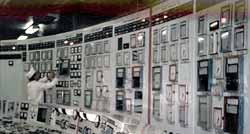
|
April 2000
Highlights |
Armenia Bulgaria Czech Republic Hungary |
Kazakhstan Lithuania Russia Slovakia |
Ukraine United States Cross-Cutting Activities Planned Activities |
Russia
Bilibino analytical simulator undergoes site acceptance tests
The U.S.-provided analytical simulator for Bilibino NPP successfully completed site acceptance testing on April 28 at the plant site in far-eastern Russia. Technical specialists from LAKROM, the Russian subcontractor for software development, accompanied the simulator shipment to the plant and collaborated with Bilibino NPP staff to run this final round of acceptance tests.
 Operators training to work in the Bilibino NPP control rooms soon will benefit from the plant's new analytical simulator. Provided with support from the U.S. team, the simulator's computer screens replicate the complex instrument panels and gauges shown here. |
In comparison to a full-scope simulator, an analytical simulator uses computer monitor screens instead of replicated control panels. The computer's graphic displays represent plant systems. Operators enter computer commands to practice responding to various plant conditions. GSE Power Systems, Inc., is the U.S. overall contractor for the Bilibino simulator development work.
After the tests were completed, the specialists declared the new simulator "ready for training." Actual certification of the simulator for training will be done by Gosatomnadzor, Russia's organization responsible for regulating the safety of nuclear reactors. That will be done as part of the official simulator turnover activities scheduled for late May/early June (see Planned Activities). Following the turnover, Bilibino NPP will have a state-of-the-art tool for training the plant's reactor operators, greatly augmenting the site's existing training program. (John Yoder, DOE, 301-903-5650; Joe Cleary, PNNL, 509-372-4094) ![]()
Workshop covers multiple aspects of spent fuel management
At the end of March, representatives of Gosatomnadzor participated in a workshop on spent fuel management held in St. Petersburg. The participants came from a cross section of the organization's facilities in Russia--the headquarters office, the Scientific and Engineering Center, and the Leningrad, Volga, and Chelyabinsk regional offices.
Gosatomnadzor is the Russian agency responsible for regulating the safety of nuclear reactors and fuel cycle enterprises. Gosatomnadzor is the shortened form of the name Gosudarskvenniy Kommityet po Atomnoi u Yadernii Nadzory, which translates to State Committee for the Supervision of Atomic and Radiation Safety.
The U.S. team, represented by two technical experts from Pacific Northwest National Laboratory, organized and conducted the workshop specifically for the Gosatomnadzor group.
The U.S. specialists covered a wide range of relevant topics in their presentations:
- magnitude of the spent fuel management challenge in the United States
- overview of spent fuel management technologies
- licensing requirements for spent fuel storage
- spent fuel pool island option
- naval propulsion spent nuclear fuel storage
- computer codes for spent fuel storage safety analysis
- radiological safety and emergency planning requirements for spent fuel storage
- Point Beach spent fuel cask hydrogen ignition event
- radiological safety and emergency planning for spent fuel storage facilities
- quality assurance issues related to the Vectra spent fuel cask.
The Russian participants presented their proposed regulations for spent fuel storage, practices for handling of damaged fuel, and proposed safety requirements for spent fuel reprocessing. In addition, two issues were introduced during the workshop:
- As of March 20, 2000, Minatom stated it would comply with Gosatomnadzor's requirements and normative documents for the spent fuel cask being designed and provided under the Arctic Military Environmental Cooperation and Cooperative Threat Reduction programs, likely resolving an issue. Minatom has maintained that Gosatomnadzor does not have jurisdiction in the matter.
- The issue of burnup credit for criticality analyses for spent fuel storage casks is a significant area of discussion in licensing actions for both the U.S. and Russian representatives.
Overall, participants judged the workshop as highly successful and informative for all participants. (Grigory Trosman, DOE, 301-903-3581; Mike McKinnon, PNNL, 509-372-4198) ![]()